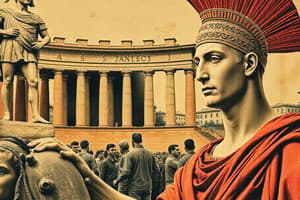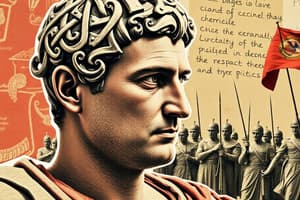Podcast
Questions and Answers
What significant military achievement did Caesar accomplish during his campaigns in Gaul?
What significant military achievement did Caesar accomplish during his campaigns in Gaul?
- Documented his campaigns in 'Commentarii de Bello Gallico' (correct)
- Conquered all of Europe
- Wrote a comprehensive history of Roman wars
- Established the Roman navy
Which event marks the beginning of the civil war that Caesar instigated?
Which event marks the beginning of the civil war that Caesar instigated?
- His crossing of the Rubicon River (correct)
- The assassination of Crassus
- The formation of the First Triumvirate
- The election as consul
What was one of the key reforms Caesar implemented as dictator for life?
What was one of the key reforms Caesar implemented as dictator for life?
- Limited the power of provincial governors
- Created a new currency system
- Addressed issues of debt and land distribution (correct)
- Established a formal education system
Which title or recognition is closely associated with Julius Caesar's legacy?
Which title or recognition is closely associated with Julius Caesar's legacy?
What was one of the consequences of Caesar's assassination?
What was one of the consequences of Caesar's assassination?
Flashcards are hidden until you start studying
Study Notes
Background
- Full name: Gaius Julius Caesar
- Birth: July 12 or 13, 100 BC, in Rome
- Death: March 15, 44 BC (the Ides of March)
- Profession: Roman general, statesman, and key figure in the rise of the Roman Empire
Early Life
- Born into the patrician class; family claims descent from Venus.
- Became active in politics at a young age; served as military tribune and under Sulla's command.
Military Career
- Known for his military conquests, notably in Gaul (58-50 BC).
- Wrote "Commentarii de Bello Gallico," documenting his campaigns and asserting his leadership.
Political Career
- Formed the First Triumvirate with Pompey and Crassus in 60 BC.
- Elected consul in 59 BC; enacted populist reforms, which antagonized the Senate.
Dictatorships
- After the death of Crassus and conflicts with Pompey, Caesar crossed the Rubicon River in 49 BC, igniting a civil war.
- Defeated Pompey and became the sole ruler of Rome by 46 BC.
- Appointed dictator for life in 44 BC, enacting reforms to address debt, land distribution, and the calendar (Julian calendar).
Reforms and Policies
- Expanded the Senate; introduced measures to increase citizens' participation.
- Undertook significant public works projects.
- Reformed the provincial administration to reduce corruption.
Assassination
- Caesar's concentration of power led to growing resentment among senators.
- Assassinated on the Ides of March (March 15, 44 BC) by a group of senators, including Brutus and Cassius.
- His death led to further civil wars and the eventual rise of his adopted heir, Octavian (Augustus).
Legacy
- Considered a pivotal figure in the transition from Roman Republic to Empire.
- Influence persists in literature, culture, and the concept of political leadership (e.g., "Caesar" as a title for rulers).
- His life and death have been immortalized in various works, including Shakespeare's play "Julius Caesar."
Early Life and Family
- Born into the patrician class, a privileged social group in Roman society.
- His family claimed lineage from the goddess Venus, highlighting their perceived social standing.
- Showed early interest in politics, serving as a military tribune and gaining experience under Sulla.
Military Victories and Leadership
- Known for successful military campaigns, particularly in Gaul (modern France) from 58 to 50 BC.
- "Commentarii de Bello Gallico" (Commentaries on the Gallic War), his personal account of these campaigns, established his reputation as a military leader.
Political Power and Alliances
- Formed the First Triumvirate with Pompey and Crassus in 60 BC, a political alliance aiming for shared control.
- Elected consul in 59 BC, a powerful position, and implemented populist reforms, which angered the Senate.
Civil War and Rise to Power
- Tensions with Pompey led to the crossing of the Rubicon River in 49 BC, a symbolic act that triggered civil war.
- After defeating Pompey, Caesar became Rome's sole ruler by 46 BC.
Dictatorship and Reforms
- Appointed dictator for life in 44 BC, consolidating his power.
- Implemented reforms addressing debt, land distribution, and the calendar, introducing the Julian calendar.
Assassination and Legacy
- Caesar's concentration of power sparked resentment among senators.
- Assassinated on the Ides of March (March 15, 44 BC) by a group of senators led by Brutus and Cassius.
- His death led to further civil wars and ultimately paved the way for the rise of Octavian (Augustus) as emperor.
Enduring Influence
- Considered a crucial figure in the transformation from the Roman Republic to the Roman Empire.
- His name, "Caesar," has become synonymous with power and leadership, influencing titles and perceptions.
- His life and death remain relevant in literature, culture, and historical analysis, evident in Shakespeare's play "Julius Caesar."
Studying That Suits You
Use AI to generate personalized quizzes and flashcards to suit your learning preferences.




